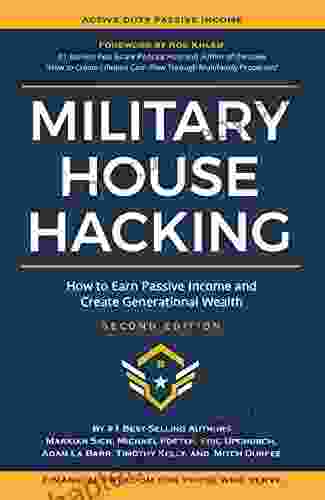Going to university abroad: Everything you need to know

5 out of 5
| Language | : | English |
| File size | : | 1528 KB |
| Text-to-Speech | : | Enabled |
| Screen Reader | : | Supported |
| Enhanced typesetting | : | Enabled |
| Word Wise | : | Enabled |
| Print length | : | 194 pages |
Are you thinking about going to university abroad? It's a big decision, but it can be one of the most rewarding experiences of your life. Studying abroad will give you the opportunity to learn about new cultures, meet new people, and gain a global perspective. It can also help you develop your independence and self-confidence.
Of course, there are also some challenges to studying abroad. You'll need to adjust to a new culture, a new academic system, and a new way of life. But if you're prepared for these challenges, you'll be able to make the most of your experience.
Here are some things to consider if you're thinking about going to university abroad:
- Choose the right university. There are thousands of universities around the world, so it's important to do your research and find one that's a good fit for you. Consider your academic interests, your budget, and your desired location.
- Apply for a visa. Depending on your nationality, you may need to apply for a visa to study abroad. The process can vary depending on the country you're going to, so be sure to research the requirements well in advance.
- Pack your bags. Once you've been accepted to a university and have your visa, it's time to start packing your bags. Be sure to pack light, as you'll likely be living in a dorm room or shared apartment.
- Settle in. The first few weeks of studying abroad can be a bit overwhelming. But don't worry, you'll soon get used to your new surroundings. Take some time to explore your new city, meet new people, and get involved in campus activities.
- Study hard. Studying abroad is a great opportunity to learn about new cultures and meet new people. But don't forget that you're also there to learn. Be sure to attend class regularly, do your readings, and participate in discussions.
- Have fun. Studying abroad is a once-in-a-lifetime experience. Be sure to take advantage of it and have some fun. Explore your new city, meet new people, and try new things.
Studying abroad can be a life-changing experience. It's an opportunity to learn about new cultures, meet new people, and gain a global perspective. If you're thinking about going to university abroad, I encourage you to do your research and make the most of this amazing opportunity.
Benefits of studying abroad
There are many benefits to studying abroad. Here are just a few:
- You'll learn about new cultures. Studying abroad is a great way to immerse yourself in a new culture. You'll get to experience new foods, new customs, and new ways of life. This can be a great way to broaden your horizons and learn about the world.
- You'll meet new people. Studying abroad is a great way to meet new people from all over the world. You'll make friends from different cultures and backgrounds, and you'll learn about their lives and experiences. This can be a great way to expand your social circle and learn about different perspectives.
- You'll gain a global perspective. Studying abroad will give you a global perspective on the world. You'll learn about different cultures, different political systems, and different economic systems. This can help you to better understand the world around you and make more informed decisions about your future.
- You'll develop your independence and self-confidence. Studying abroad is a great way to develop your independence and self-confidence. You'll be living in a new country, away from your family and friends. This can be a challenge, but it can also be a great opportunity to learn how to rely on yourself and make your own decisions.
- You'll improve your career prospects. Studying abroad can improve your career prospects. Employers value employees who have international experience and a global perspective. Studying abroad can give you the skills and experience that you need to succeed in today's competitive job market.
Challenges of studying abroad
Of course, there are also some challenges to studying abroad. Here are a few things to be aware of:
- Culture shock. Culture shock is a common experience for students who study abroad. It's the feeling of disorientation and confusion that can come from being in a new culture. Culture shock can be a challenge, but it's also a temporary experience. With time, you'll adjust to your new culture and start to feel more comfortable.
- Language barriers. If you're not fluent in the language of the country you're studying in, you may experience some language barriers. This can make it difficult to communicate with your professors and classmates. However, there are many resources available to help you learn the local language. With a little effort, you'll be able to improve your language skills and make the most of your study abroad experience.
- Homesickness. Homesickness is another common experience for students who study abroad. It's the feeling of missing your family, friends, and home country. Homesickness can be a challenge, but it's also a temporary experience. With time, you'll adjust to your new home and start to feel more comfortable. In the meantime, there are many things you can do to cope with homesickness, such as staying in touch with your loved ones, making new friends, and exploring your new city.
- Financial challenges. Studying abroad can be expensive. You'll need to pay for tuition, fees, housing, food, and other expenses. However, there are many ways to reduce the cost of studying abroad, such as applying for scholarships, working part-time, and living in a budget-friendly accommodation.
Studying abroad can be a life-changing experience. It's an opportunity to learn about new cultures, meet new people, and gain a global perspective. If you're thinking about going to university abroad, I encourage you to do your research and make the most of this amazing opportunity.
5 out of 5
| Language | : | English |
| File size | : | 1528 KB |
| Text-to-Speech | : | Enabled |
| Screen Reader | : | Supported |
| Enhanced typesetting | : | Enabled |
| Word Wise | : | Enabled |
| Print length | : | 194 pages |
Do you want to contribute by writing guest posts on this blog?
Please contact us and send us a resume of previous articles that you have written.
 Book
Book Novel
Novel Page
Page Chapter
Chapter Text
Text Story
Story Genre
Genre Reader
Reader Library
Library Paperback
Paperback E-book
E-book Magazine
Magazine Newspaper
Newspaper Paragraph
Paragraph Sentence
Sentence Bookmark
Bookmark Shelf
Shelf Glossary
Glossary Bibliography
Bibliography Foreword
Foreword Preface
Preface Synopsis
Synopsis Annotation
Annotation Footnote
Footnote Manuscript
Manuscript Scroll
Scroll Codex
Codex Tome
Tome Bestseller
Bestseller Classics
Classics Library card
Library card Narrative
Narrative Biography
Biography Autobiography
Autobiography Memoir
Memoir Reference
Reference Encyclopedia
Encyclopedia Marla Taviano
Marla Taviano Matt Jackson
Matt Jackson Michael D Orazio
Michael D Orazio Ron Harvey
Ron Harvey Rebecca Rane
Rebecca Rane Trevor Boffone
Trevor Boffone Meg Keys
Meg Keys Rory Maclean
Rory Maclean Micki Savin
Micki Savin Maude Barlow
Maude Barlow Megan Taylor Morrison
Megan Taylor Morrison Megan Stine
Megan Stine Tom Billinge
Tom Billinge Mary Hollingsworth
Mary Hollingsworth Melissa Bashardoust
Melissa Bashardoust Paige Wolf
Paige Wolf Melinda Woodhall
Melinda Woodhall Mia Kankimaki
Mia Kankimaki Pittacus Lore
Pittacus Lore Mike Mirabella
Mike Mirabella
Light bulbAdvertise smarter! Our strategic ad space ensures maximum exposure. Reserve your spot today!

 Heath PowellHow Our Greatest Desert Came To Be: Unraveling the Enigmatic Origins of the...
Heath PowellHow Our Greatest Desert Came To Be: Unraveling the Enigmatic Origins of the...
 Ashton ReedUnlock the Lucrative World of Real Estate in The Bahamas: Essential Guide for...
Ashton ReedUnlock the Lucrative World of Real Estate in The Bahamas: Essential Guide for... Bryan GrayFollow ·10.8k
Bryan GrayFollow ·10.8k Sidney CoxFollow ·13.8k
Sidney CoxFollow ·13.8k Robert Louis StevensonFollow ·2.3k
Robert Louis StevensonFollow ·2.3k Matt ReedFollow ·19.9k
Matt ReedFollow ·19.9k Edwin BlairFollow ·13.9k
Edwin BlairFollow ·13.9k Clarence BrooksFollow ·19.7k
Clarence BrooksFollow ·19.7k Jean BlairFollow ·17k
Jean BlairFollow ·17k Harvey HughesFollow ·16.9k
Harvey HughesFollow ·16.9k

 Henry James
Henry JamesCold War Fighter Pilot Story: A Captivating Tale of...
Enter the Cockpit of...

 Rudyard Kipling
Rudyard KiplingYour Body Your Baby Your Choices: The Essential Guide to...
Pregnancy and...

 Fabian Mitchell
Fabian MitchellMichelle Obama: An Intimate Portrait - A Must-Read for...
Michelle Obama is a prominent figure in...

 Juan Butler
Juan ButlerUncover the Secrets of the Dead Land Warshawski Novels
Prepare to delve...
5 out of 5
| Language | : | English |
| File size | : | 1528 KB |
| Text-to-Speech | : | Enabled |
| Screen Reader | : | Supported |
| Enhanced typesetting | : | Enabled |
| Word Wise | : | Enabled |
| Print length | : | 194 pages |












